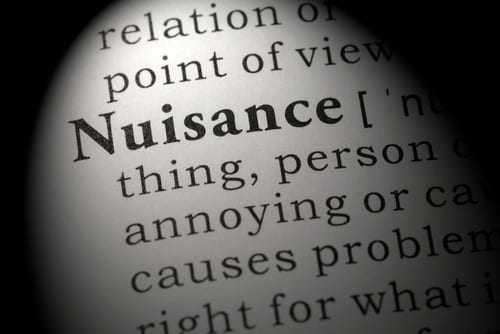Recent Blog Posts
When Can I Evict a Tenant for Disturbing the Neighbors?
 As a landlord, you might have to make some tough decisions about when to excuse a tenant’s misconduct and when to evict him for breaking the terms of his lease. One of the grounds for eviction in Illinois is creating a disturbance that interferes with the neighbors’ right to quiet enjoyment of their homes. In fact, if you fail to evict a tenant who routinely disturbs the peace, your other tenants could break their leases early and move out to escape the disruption. You will need evidence of the disruptive tenant’s behavior to show the court. A Naperville, IL landlord evictions lawyer can help you work to quickly evict the tenant who is causing problems for the neighborhood.
As a landlord, you might have to make some tough decisions about when to excuse a tenant’s misconduct and when to evict him for breaking the terms of his lease. One of the grounds for eviction in Illinois is creating a disturbance that interferes with the neighbors’ right to quiet enjoyment of their homes. In fact, if you fail to evict a tenant who routinely disturbs the peace, your other tenants could break their leases early and move out to escape the disruption. You will need evidence of the disruptive tenant’s behavior to show the court. A Naperville, IL landlord evictions lawyer can help you work to quickly evict the tenant who is causing problems for the neighborhood.
When is a Tenant Disruptive Enough to Evict?
A single incident where one tenant was too loud or made a nuisance of himself is usually not enough to support an eviction. It is normal for tenants to occasionally make noise that annoys the neighbors, such as by having their child’s friends over to play or hosting a small party during reasonable hours.
Domestic Violence and Self-Defense
 If you can show that you were acting in reasonable self-defense, your domestic violence charge can be dismissed, or you could be found not guilty at trial. It is very, very common for people to get arrested for domestic violence after defending themselves against an abusive partner. Many domestic abusers are quite skilled liars and very good at manipulating the situation to make it appear as though they are the victims. A spouse or romantic partner who has complete control over his or her victim may be completely calm when the police arrive while the actual victim is in a state of panic. If you have been arrested for domestic violence because you were defending yourself, there is hope. A Naperville, IL domestic violence lawyer can help.
If you can show that you were acting in reasonable self-defense, your domestic violence charge can be dismissed, or you could be found not guilty at trial. It is very, very common for people to get arrested for domestic violence after defending themselves against an abusive partner. Many domestic abusers are quite skilled liars and very good at manipulating the situation to make it appear as though they are the victims. A spouse or romantic partner who has complete control over his or her victim may be completely calm when the police arrive while the actual victim is in a state of panic. If you have been arrested for domestic violence because you were defending yourself, there is hope. A Naperville, IL domestic violence lawyer can help.
Proving a Self-Defense Claim
It is not always easy for the police to tell who is the victim and who is the aggressor. Looking at the obvious physical injuries on each party may not tell the full story. It is fairly common for only the aggressor to have visible injuries while the victim’s injuries are not readily apparent. If your spouse pushed you down, pulled your hair, or unlawfully restrained you, he may not have left any bruises that were visible when the police arrived. However, if you defended yourself by biting or scratching him, he may have visible injuries that caused the police to think that you were the aggressor.
Your Property and Your Tenants' Emotional Support Animal - Part 1
 Emotional support animals are a relatively new phenomenon. ESAs are not service animals and do not have the same set of rights. In general, if your tenant has a qualified emotional support animal, you must allow the animal to live with the tenant. However, you can request documentation proving that your tenant has a legitimate need for the animal as verified by his or her mental health provider. You are also only required to make reasonable accommodations to allow the ESA to live on your property, meaning that if the animal is causing significant problems, you may be able to ask your tenant to remove the animal or evict him or her. A DuPage County landlord representation lawyer can help you determine what your rights are if your tenant has an ESA.
Emotional support animals are a relatively new phenomenon. ESAs are not service animals and do not have the same set of rights. In general, if your tenant has a qualified emotional support animal, you must allow the animal to live with the tenant. However, you can request documentation proving that your tenant has a legitimate need for the animal as verified by his or her mental health provider. You are also only required to make reasonable accommodations to allow the ESA to live on your property, meaning that if the animal is causing significant problems, you may be able to ask your tenant to remove the animal or evict him or her. A DuPage County landlord representation lawyer can help you determine what your rights are if your tenant has an ESA.
What is a Qualified ESA and What Proof Can I Require?
Under Illinois law, an ESA is an animal that is needed by its handler to provide assistance with a mental health disorder. A licensed mental health provider must make the determination that his or her patient needs the animal for emotional support to help him or her cope with the symptoms of a diagnosed mental illness such as PTSD or depression.
Medical Conditions and False Positive Field Sobriety Tests
 Field sobriety tests can be unreliable. Anything from the shoes a person is wearing to the weather conditions on the side of the road can cause a person who is sober to appear intoxicated. People who have certain medical conditions might appear intoxicated during field sobriety tests when they are not. Unfortunately, police officers do not often listen to the person they have pulled over when he or she tries to explain how his or her medical condition might influence the results of the test. This can lead to needless DUI arrests. A Naperville, IL criminal defense attorney can take steps to prove that your field sobriety test was impacted by your condition.
Field sobriety tests can be unreliable. Anything from the shoes a person is wearing to the weather conditions on the side of the road can cause a person who is sober to appear intoxicated. People who have certain medical conditions might appear intoxicated during field sobriety tests when they are not. Unfortunately, police officers do not often listen to the person they have pulled over when he or she tries to explain how his or her medical condition might influence the results of the test. This can lead to needless DUI arrests. A Naperville, IL criminal defense attorney can take steps to prove that your field sobriety test was impacted by your condition.
Types of Medical Conditions That Affect Field Sobriety Tests
Common medical conditions that could mimic intoxication during a field sobriety test include:
Existing Tenants and Rule Enforcement for New Landlords
 Buying a multi-unit building that is already occupied is likely one of the simplest ways to become a landlord or expand your business. However, working with existing tenants can be challenging if the previous landlord was not so concerned with keeping the property well-maintained and enforcing policies set out in the lease. If you have found yourself in a situation where you have tenants who do not respect the terms of a lease you did not write but now own, you may be faced with backlash when trying to create a nicer community. Evicting existing tenants may eventually become necessary. A DuPage County, IL landlord representation attorney may be able to help you.
Buying a multi-unit building that is already occupied is likely one of the simplest ways to become a landlord or expand your business. However, working with existing tenants can be challenging if the previous landlord was not so concerned with keeping the property well-maintained and enforcing policies set out in the lease. If you have found yourself in a situation where you have tenants who do not respect the terms of a lease you did not write but now own, you may be faced with backlash when trying to create a nicer community. Evicting existing tenants may eventually become necessary. A DuPage County, IL landlord representation attorney may be able to help you.
Common Issues When Working With Existing Tenants and When to Evict
“I know it is in the lease, but the old landlord never cared” is a phrase you may quickly tire of hearing. Problems you might encounter as the new landlord of an already-occupied building may include:
Defending Multiple Criminal Charges in Illinois
 It is common for a person who gets arrested to be charged with more than one criminal offense. This is especially true if your arrest stemmed from a traffic stop. People may get pulled over for a mundane reason, like speeding or having a taillight out, only for the police to discover that the person appears to be under the influence of drugs. Then, while making a DUI arrest, the police search the vehicle and discover that the person is also in possession of drugs. Now, the arrestee is facing both a DUI and a possession charge. If the person being arrested is, in fact, quite under the influence and cannot calm down and submit to the officers, now they are also charged with resisting arrest on top of the other two charges. If you are facing multiple criminal charges in Illinois, the situation is not hopeless, but it is important to contact a skilled Naperville, IL criminal defense lawyer immediately.
It is common for a person who gets arrested to be charged with more than one criminal offense. This is especially true if your arrest stemmed from a traffic stop. People may get pulled over for a mundane reason, like speeding or having a taillight out, only for the police to discover that the person appears to be under the influence of drugs. Then, while making a DUI arrest, the police search the vehicle and discover that the person is also in possession of drugs. Now, the arrestee is facing both a DUI and a possession charge. If the person being arrested is, in fact, quite under the influence and cannot calm down and submit to the officers, now they are also charged with resisting arrest on top of the other two charges. If you are facing multiple criminal charges in Illinois, the situation is not hopeless, but it is important to contact a skilled Naperville, IL criminal defense lawyer immediately.
6 Ways Illinois Residents Can Still Get in Trouble for Cannabis
 Recreational cannabis use has been legal for adults over 21 years old in Illinois for years now. Legalization was widely regarded as a step towards reducing the number of people who are incarcerated for very minor drug crimes. Most people can purchase, possess, and use reasonable amounts of marijuana legally. However, there are still situations where an Illinois resident can face criminal prosecution for cannabis-related crimes. THC products are generally legal but regulated. If you have been arrested in Illinois for a cannabis charge, it is important to consult with a DuPage County drug crimes attorney immediately. Some charges can even be considered felonies.
Recreational cannabis use has been legal for adults over 21 years old in Illinois for years now. Legalization was widely regarded as a step towards reducing the number of people who are incarcerated for very minor drug crimes. Most people can purchase, possess, and use reasonable amounts of marijuana legally. However, there are still situations where an Illinois resident can face criminal prosecution for cannabis-related crimes. THC products are generally legal but regulated. If you have been arrested in Illinois for a cannabis charge, it is important to consult with a DuPage County drug crimes attorney immediately. Some charges can even be considered felonies.
Types of Cannabis Offenses Still Prosecuted in Illinois
A few ways Illinois residents and visitors to the state can get arrested and charged with a crime related to marijuana include:
When is Retail Theft a Felony in Illinois?
 In Illinois, retail theft can be charged as a felony under certain circumstances. Illinois states retail theft as the act of taking possession of, carrying away, or transferring any merchandise displayed for sale in a retail establishment with the intention of not paying for the item. If you are facing charges related to retail theft, discuss your case with a lawyer to ensure you can obtain a robust defense to fight the charges you are facing adequately.
In Illinois, retail theft can be charged as a felony under certain circumstances. Illinois states retail theft as the act of taking possession of, carrying away, or transferring any merchandise displayed for sale in a retail establishment with the intention of not paying for the item. If you are facing charges related to retail theft, discuss your case with a lawyer to ensure you can obtain a robust defense to fight the charges you are facing adequately.
When Does Retail Theft Become a Felony?
Several factors can elevate a retail theft offense to a felony charge:
Potential Defense Strategies When Charged with Assault
 Being charged with a violent crime like assault in Illinois can be a frightening thing, especially for those without experience dealing with the criminal justice system. However, even when charged with a violent crime, it is important to understand and take advantage of the various defense strategies that may be used to help fight and possibly defeat the charges you are facing. Contact an experienced criminal defense lawyer to ensure you have the legal guidance of a professional with experience defending clients against charges related to violent crime.
Being charged with a violent crime like assault in Illinois can be a frightening thing, especially for those without experience dealing with the criminal justice system. However, even when charged with a violent crime, it is important to understand and take advantage of the various defense strategies that may be used to help fight and possibly defeat the charges you are facing. Contact an experienced criminal defense lawyer to ensure you have the legal guidance of a professional with experience defending clients against charges related to violent crime.
Here Are Defense Strategies to Be Aware Of
-
Self-defense – Of course, when dealing with an assault charge, one of the most common defenses is self-defense. If you can establish that you acted in self-defense, meaning you reasonably believed that you were in imminent danger of harm, you may be able to have the charges against you reduced or dismissed. To pursue this line of defense, it will be essential you provide evidence, such as witness testimonies or video footage, to support your claim. Additionally, demonstrating that your use of force was proportionate to the threat you were facing is something that can help strengthen your defense.
Understanding the Causes for Eviction in Illinois
 Eviction can be a complex and sensitive issue for both landlords and tenants. In Illinois, landlords must adhere to specific laws and regulations when seeking to evict a tenant. If you are a landlord looking for legal assistance regarding evicting a tenant, an eviction attorney for landlords can help you make this possible. By contacting a landlord eviction lawyer, you can understand your rights and responsibilities regarding this civil litigation process associated with landlord evictions in the state.
Eviction can be a complex and sensitive issue for both landlords and tenants. In Illinois, landlords must adhere to specific laws and regulations when seeking to evict a tenant. If you are a landlord looking for legal assistance regarding evicting a tenant, an eviction attorney for landlords can help you make this possible. By contacting a landlord eviction lawyer, you can understand your rights and responsibilities regarding this civil litigation process associated with landlord evictions in the state.
Five Causes for Eviction in Illinois
-
Nonpayment of rent – One of the most common reasons for eviction is when a tenant fails to pay rent on time or consistently falls behind on payments. Landlords have the right to pursue eviction proceedings if the tenant fails to fulfill their financial obligations.





